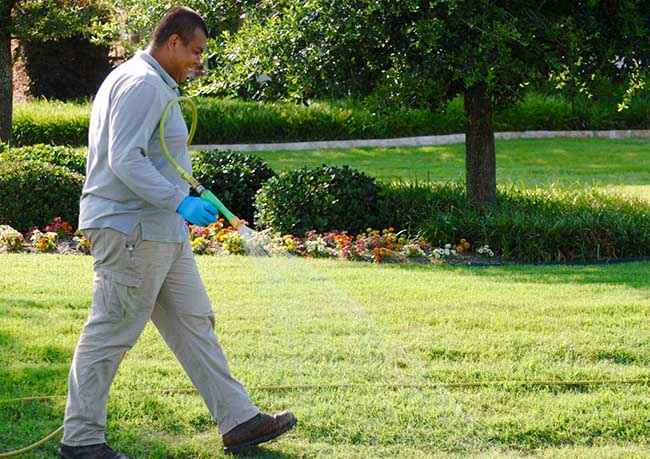
Introduction: Why Seasonal Weed Control Matters
Maintaining a healthy lawn requires more than just regular mowing and watering. One of the most essential aspects of lawn care is seasonal weed control, which can make the difference between a lush, green lawn and a weed-infested yard. Weeds compete with grass for essential nutrients, sunlight, and water, and can quickly take over if left unchecked. A proactive, seasonal approach to weed control ensures that your lawn stays healthy, vibrant, and free from invasive weeds. In this article, we will explore the key strategies for effective seasonal weed control, focusing on the different stages of the year and how to target weeds at each phase of growth.
Understanding Seasonal Weed Control
Seasonal weed control involves strategically applying treatments at various times throughout the year to prevent weeds from taking over your lawn. Weeds have different growth cycles, and understanding these cycles is crucial for effective control. By timing your treatments based on the season, you can ensure that your lawn receives the right care at the right time. From early spring to late fall, each season presents unique opportunities for preventing weed growth and maintaining the overall health of your lawn.
Spring: The Time for Pre-Emergent Weed Prevention
Spring is a crucial time for seasonal weed control, as it sets the stage for the entire year. As temperatures begin to rise, weeds such as crabgrass and dandelions start to germinate. The key to preventing these early-season weeds is applying a pre-emergent weed control treatment. Pre-emergent herbicides work by creating a barrier that prevents weed seeds from sprouting. By applying this treatment in early spring, ideally before the soil temperature reaches 55°F, you can significantly reduce the number of weeds that take root in your lawn.
Early Summer: Spot Treatments for Emerging Weeds
As the weather warms and your lawn starts to thrive, it’s time to monitor for any weeds that may have slipped past your early-season treatments. Seasonal weed control during early summer focuses on spot treatments, targeting weeds that have already emerged. Broadleaf weeds, such as dandelions and clover, are common during this period. If left unchecked, these weeds can spread rapidly and damage your turf. Using a selective herbicide that targets only the weeds without harming the grass is crucial. Regular monitoring and spot treatment will keep your lawn looking pristine.
Mid-Summer: Fertilization and Weed Control
Mid-summer is an excellent time for combining seasonal weed control with fertilization. At this stage, your grass needs nutrients to maintain its health and withstand the heat of the summer months. A balanced, nutrient-rich fertilizer will promote strong root development, making it more difficult for weeds to take hold. Additionally, applying a targeted weed control treatment that addresses both broadleaf and grassy weeds ensures that your lawn stays free from invasive species. This dual approach of fertilization and weed control will help your lawn thrive in the heat and stay resilient to weed pressure.
Late Summer: Preparing for Fall with Weed and Feed Treatments
As the summer heat starts to fade, it’s important to prepare your lawn for the cooler months ahead. Late summer is an ideal time for a weed and feed treatment, which combines seasonal weed control with a dose of fertilizer to strengthen your lawn. This treatment helps to control any remaining summer weeds while providing the necessary nutrients for your grass to recover from the stress of the summer heat. By applying a weed and feed product, you can help your lawn maintain its health and prevent late-season weed growth.
Fall: Root-Strengthening Treatments for Weed Prevention
Fall is one of the most important seasons for seasonal weed control. As temperatures cool, grass growth slows down, and the lawn enters a period of dormancy. However, this is also the best time for root-strengthening treatments. Applying a slow-release fertilizer in the fall encourages deep root growth, helping your grass develop a strong foundation for the following spring. Weeds like winter annuals, including chickweed and henbit, often germinate in the fall. A targeted herbicide treatment during this time will prevent these weeds from taking hold and ensure that your lawn remains healthy and weed-free through the winter.
Winter: Preventing Weeds from Coming Back
Winter is often seen as a dormant period for lawns, but it’s still important to think about seasonal weed control. While weeds aren’t actively growing, they can still be prevented from resurfacing when spring arrives. To prepare for the upcoming season, consider applying a dormant oil treatment to prevent winter weeds from overwintering and emerging in early spring. This simple step can save you time and effort in the months ahead and contribute to a healthier, more resilient lawn.
Choosing the Right Products for Seasonal Weed Control
Selecting the right products for seasonal weed control is crucial to the success of your lawn care routine. There are various types of herbicides available, including pre-emergent and post-emergent options, each designed to target different types of weeds. It’s important to choose the right products based on the weeds you’re dealing with and the time of year. Organic or eco-friendly products are also a great option for homeowners looking to reduce their environmental impact while still maintaining an effective weed control program.
Customizing Your Seasonal Weed Control Plan
Each lawn is unique, and an effective seasonal weed control plan should be tailored to the specific needs of your yard. Factors such as soil type, grass species, and local climate conditions all play a role in determining the best treatment schedule for your lawn. A customized plan ensures that your lawn receives the right care at the right time, resulting in a healthier, more vibrant turf. Consulting with a lawn care professional can help you develop a personalized weed control plan that addresses the unique needs of your lawn.
Eco-Friendly Weed Control Methods
For homeowners concerned about the environment, eco-friendly weed control methods can be an effective alternative to chemical herbicides. There are several natural options for seasonal weed control, including organic herbicides, mulch, and proper lawn maintenance practices. For example, mowing your lawn at the right height and watering it deeply but infrequently can help your grass grow strong, making it more resistant to weeds. Additionally, using mulch in flower beds and around trees can prevent weed seeds from germinating.
The Importance of Regular Lawn Maintenance
Regular lawn maintenance is essential for effective seasonal weed control. Mowing your lawn at the proper height, removing thatch, and aerating the soil are all important practices that help create a healthy, weed-resistant lawn. A well-maintained lawn is less likely to experience weed infestations because healthy grass can outcompete weeds for nutrients, water, and sunlight. Regular maintenance also allows you to spot potential weed problems early, so you can address them before they become a larger issue.
Monitoring for New Weeds Throughout the Year
Even with a comprehensive seasonal weed control plan in place, it’s essential to monitor your lawn regularly for new weed growth. Weeds can emerge at any time of the year, so it’s important to stay vigilant and act quickly when you spot them. Early intervention is key to preventing weeds from taking over your lawn. Regularly inspect your lawn for emerging weeds and address them with spot treatments or targeted herbicide applications.
Benefits of Professional Seasonal Weed Control
While DIY seasonal weed control can be effective, there are many benefits to hiring a professional lawn care service. Professionals have access to high-quality products, the latest techniques, and the expertise needed to develop a customized weed control plan for your lawn. Additionally, they can handle the timing of treatments, ensuring that your lawn receives the right care at the optimal times throughout the year.
Cost-Effectiveness of Seasonal Weed Control Plans
Investing in a comprehensive seasonal weed control plan can save you money in the long run. Weeds that are left unchecked can quickly spread and cause significant damage to your lawn, leading to costly repairs and treatments. By preventing weeds from taking hold early on, you can reduce the need for expensive treatments and maintain a beautiful, healthy lawn year-round.
How to Tell If Your Lawn Needs Seasonal Weed Control
If you’re unsure whether your lawn needs seasonal weed control, look for signs of weed growth. Common indicators include patches of yellow or sparse grass, areas of uneven growth, or visible weeds such as dandelions, crabgrass, or clover. If you notice any of these signs, it’s time to take action. A thorough seasonal weed control plan will help you restore your lawn to its former glory and prevent further weed issues.
Conclusion: Achieving a Lush, Weed-Free Lawn
In conclusion, seasonal weed control is essential for maintaining a lush, weed-free lawn. By implementing a tailored weed control plan that includes pre-emergent treatments, spot treatments, fertilization, and fall root-strengthening applications, you can ensure that your lawn stays healthy and vibrant year-round. Regular maintenance, monitoring for new weeds, and the use of eco-friendly products will further enhance your lawn’s resistance to weeds. Whether you choose to handle your lawn care on your own or hire a professional, taking the time to invest in seasonal weed control will pay off in the form of a healthier, more resilient lawn. Don’t forget to visit the homepage for exclusive content.
FAQs:
- What is the best time to apply pre-emergent weed control?
Pre-emergent weed control should be applied in early spring, before the soil temperature reaches 55°F, to prevent weed seeds from germinating. - Can I control weeds without using chemicals?
Yes, eco-friendly options such as organic herbicides, mulch, and proper lawn care practices can help control weeds without chemicals. - How often should I fertilize my lawn for effective weed control?
Fertilizing your lawn two to three times a year, in spring, summer, and fall, will help strengthen your grass and make it more resistant to weeds. - What are the most common weeds to target with seasonal weed control?
Common weeds to target include dandelions, crabgrass, clover, and chickweed. These weeds often appear during different seasons and require different treatments. - Can seasonal weed control help prevent weed growth in flower beds?
Yes, using mulch and applying pre-emergent treatments in flower beds can prevent weed seeds from germinating and spreading.
Contact Us
- Name: Best Lawn Guy
- Address: P O Box 534 Rosemount, MN 55068
- Phone: 651-994-8855
- Email: [email protected]
- Website: bestlawnguymn.com
- Instagram: https://www.instagram.com/bestlawnguymn/
- Facebook: https://www.facebook.com/bestlawnguymn/






